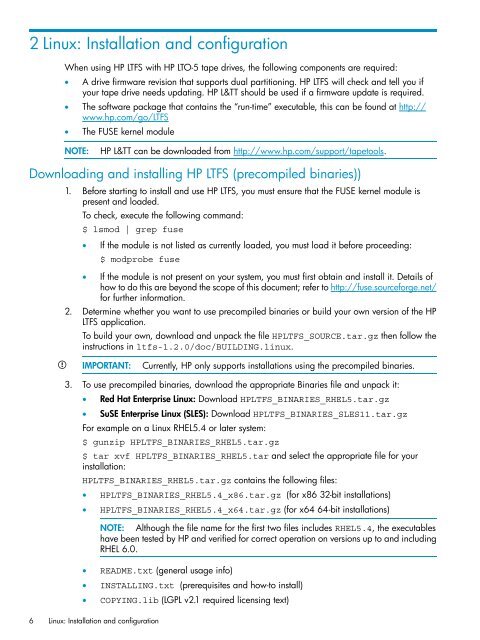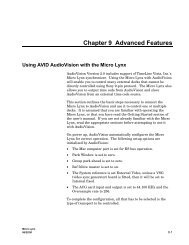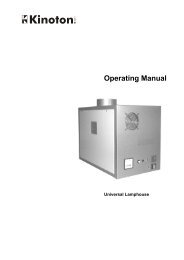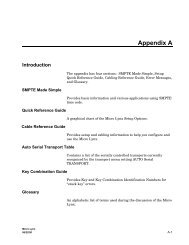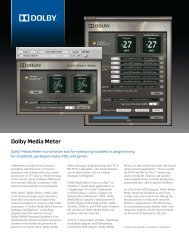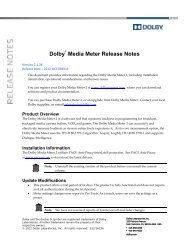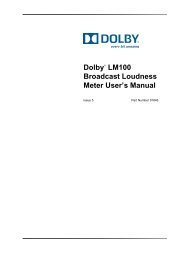HP LTFS Linear Tape File System user guide
HP LTFS Linear Tape File System user guide
HP LTFS Linear Tape File System user guide
You also want an ePaper? Increase the reach of your titles
YUMPU automatically turns print PDFs into web optimized ePapers that Google loves.
2 Linux: Installation and configuration<br />
When using <strong>HP</strong> <strong>LTFS</strong> with <strong>HP</strong> LTO-5 tape drives, the following components are required:<br />
• A drive firmware revision that supports dual partitioning. <strong>HP</strong> <strong>LTFS</strong> will check and tell you if<br />
your tape drive needs updating. <strong>HP</strong> L&TT should be used if a firmware update is required.<br />
• The software package that contains the “run-time” executable, this can be found at http://<br />
www.hp.com/go/<strong>LTFS</strong><br />
• The FUSE kernel module<br />
NOTE:<br />
<strong>HP</strong> L&TT can be downloaded from http://www.hp.com/support/tapetools.<br />
Downloading and installing <strong>HP</strong> <strong>LTFS</strong> (precompiled binaries))<br />
1. Before starting to install and use <strong>HP</strong> <strong>LTFS</strong>, you must ensure that the FUSE kernel module is<br />
present and loaded.<br />
To check, execute the following command:<br />
$ lsmod | grep fuse<br />
• If the module is not listed as currently loaded, you must load it before proceeding:<br />
$ modprobe fuse<br />
• If the module is not present on your system, you must first obtain and install it. Details of<br />
how to do this are beyond the scope of this document; refer to http://fuse.sourceforge.net/<br />
for further information.<br />
2. Determine whether you want to use precompiled binaries or build your own version of the <strong>HP</strong><br />
<strong>LTFS</strong> application.<br />
To build your own, download and unpack the file <strong>HP</strong><strong>LTFS</strong>_SOURCE.tar.gz then follow the<br />
instructions in ltfs-1.2.0/doc/BUILDING.linux.<br />
IMPORTANT:<br />
Currently, <strong>HP</strong> only supports installations using the precompiled binaries.<br />
3. To use precompiled binaries, download the appropriate Binaries file and unpack it:<br />
• Red Hat Enterprise Linux: Download <strong>HP</strong><strong>LTFS</strong>_BINARIES_RHEL5.tar.gz<br />
• SuSE Enterprise Linux (SLES): Download <strong>HP</strong><strong>LTFS</strong>_BINARIES_SLES11.tar.gz<br />
For example on a Linux RHEL5.4 or later system:<br />
$ gunzip <strong>HP</strong><strong>LTFS</strong>_BINARIES_RHEL5.tar.gz<br />
$ tar xvf <strong>HP</strong><strong>LTFS</strong>_BINARIES_RHEL5.tar and select the appropriate file for your<br />
installation:<br />
<strong>HP</strong><strong>LTFS</strong>_BINARIES_RHEL5.tar.gz contains the following files:<br />
• <strong>HP</strong><strong>LTFS</strong>_BINARIES_RHEL5.4_x86.tar.gz (for x86 32-bit installations)<br />
• <strong>HP</strong><strong>LTFS</strong>_BINARIES_RHEL5.4_x64.tar.gz (for x64 64-bit installations)<br />
NOTE: Although the file name for the first two files includes RHEL5.4, the executables<br />
have been tested by <strong>HP</strong> and verified for correct operation on versions up to and including<br />
RHEL 6.0.<br />
• README.txt (general usage info)<br />
• INSTALLING.txt (prerequisites and how-to install)<br />
• COPYING.lib (LGPL v2.1 required licensing text)<br />
6 Linux: Installation and configuration


